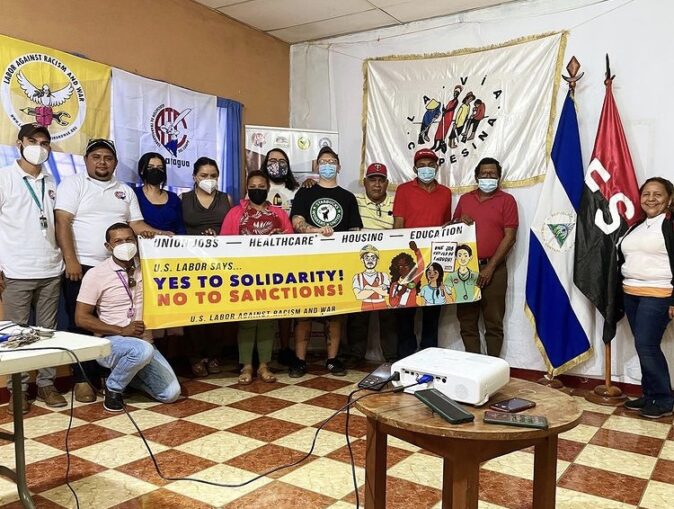U.S. delegation to Nicaragua demands ‘End U.S. sanctions!’
Managua, Nicaragua
Members of anti-imperialist organizations from around the U.S. travelled to Nicaragua during the week of Jan. 10 to observe the inauguration of President Daniel Ortega and Vice President Rosario Murillo of the party of the Sandinista National Liberation Front (Frente Sandinista de Liberación Nacional, FSLN).

Delegates from Labor Against Racism and War and Workers World Party with members of the ATC (Asociación de Trabajadores del Campo), Managua.
Ortega and Murillo’s landslide victory came after a failed U.S.-backed coup in 2018, when the anti-communist opposition continued the work of the Contras — the U.S.-backed counterrevolutionary groups of the 1980s — assaulting and killing police and FSLN supporters.
The failed coup attempt alerted the Nicaraguan people that it was important to support the revolutionary government and that the gains of the revolution are constantly under imperialist attack.
The U.S. delegation consisted of members of Alliance For Global Justice, Black Agenda Report, Black Alliance for Peace, Pastors for Peace, Workers World Party and other anti-imperialist activists and reporters.
Delegates from Workers World Party spent the first days of the week with the
Friends of the ATC (Asociación de Trabajadores del Campo), a solidarity network of international supporters. The ATC is a federation of trade unions and agricultural cooperatives in Nicaragua, mostly composed of workers who produce coffee, bananas and palm oil.
The mission of the ATC is to coordinate issues faced by farmers and agitate for discussion related to labor rights. The organization works constantly to train new labor leaders in organizing skills and political education. Fighting for freedom of workers, upholding labor protection laws, addressing health care needs of workers and fighting for environmental justice — these issues fall within the purview of the ATC.
Every day new leaders emerge in the Nicaraguan labor movement, and the ATC is ready to assist and train them, with a focus on training women and LGBTQ+ workers.
The ATC was among the first labor organizations formed during the Sandinista Revolution and played a part in the underground struggle against the dictatorship of Anastasio “Tachito” Somoza, president for most of 1967 through 1979.
During this time, unions were illegal in Nicaragua. Farming conditions were very close to slavery, as representatives from the ATC emphasized. Assassinations and attacks on workers by the repressive regime were common. One of the first accomplishments of the Revolution was to enact agrarian reform and create co-ops and unions.
ATC speakers stressed above all that, besides fighting for better conditions, workers should not lose sight of the goal of being able to exercise control and ownership of their workplaces. With Ortega’s inauguration, the labor movement must be ready to consolidate their gains and defend the Revolution.
International worker solidarity
Workers World Party delegates had the chance to visit Casa Ben Linder, named for an engineer and supporter of the popular Sandinista Revolution from Portland, Oregon, who was killed by the Contras in 1987.
Linder was killed along with two Nicaraguan comrades while installing electrical infrastructure for rural Nicaraguans. Since 1988, Casa Ben Linder has been a place where people visiting Nicaragua can come to affirm their solidarity with the people of Nicaragua and the Sandinista Revolution.
As the visiting delegation witnessed the Jan. 10 inauguration ceremonies, they heard President Ortega declare his elation about Nicaragua’s renewed relationship with Peoples’ China: “Our Revolutions, the Chinese Revolution and the Sandinista Revolution are revolutions . . . with the same path, with the same destiny, which is to end poverty.”
Delegates heard this theme repeated beyond President Ortega — the Nicaraguan workers, union organizers and writers are excited about the possibilities for self determination opened up by a renewed relationship with China.
Ortega demanded reparations by the United States to the people of Nicaragua for the destruction and mass death caused by the U.S.-funded Contras. The International Court of Justice, the U.N.’s principal judicial body, has ruled the U.S. is responsible for paying these.
Ortega addressed President Joe Biden on reparations: “We are not asking for handouts; we are asking for justice!”
Ortega called for an end to the criminal blockade of Cuba by the U.S. and railed against its ongoing sanctions on Nicaragua. The U.S. and EU actually applied new sanctions on Nicaragua on the day of the inauguration.
Delegates from the U.S. held a Jan. 12 press conference with the international media. They called for an end to sanctions and exposed the hypocrisy of the U.S. government. This writer, speaking on behalf of Workers World Party, highlighted the fact that many rights and necessities which workers and oppressed people in the U.S. are still fighting to gain, the Nicaraguan people have already won through the popular Sandinista Revolution.
These achievements include free health care, free education, unlimited paid sick leave, food self-sufficiency, the return of lands to Indigenous communities and much more.
Working-class and oppressed people in the U.S. know that Nicaragua is not the enemy. Speakers at the press conference recognized that U.S. sanctions are an act of war and demanded an immediate end to sanctions against Nicaragua and every other country so targeted by the United States.
This most recent delegation to Nicaragua is in a long tradition of solidarity with the Sandinista Revolution and will not be the last. More and more anti-imperialists from the U.S. are building relationships and connecting struggles of workers at home to workers around the world, to bring our international working class together.
The main takeaway we bring back to our comrades in the U.S. is that the class struggle is worldwide. We must affirm solidarity with the people of Nicaragua against the U.S. government and capitalist system which terrorize the people inside this country and throughout the world.
The writer was a member of the U.S. delegation.

